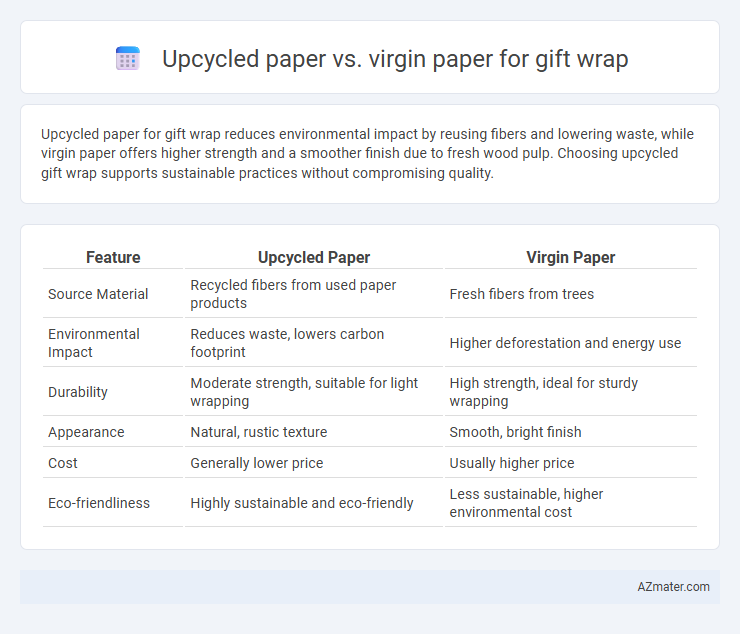Upcycled paper for gift wrap reduces environmental impact by reusing fibers and lowering waste, while virgin paper offers higher strength and a smoother finish due to fresh wood pulp. Choosing upcycled gift wrap supports sustainable practices without compromising quality.
Table of Comparison
| Feature | Upcycled Paper | Virgin Paper |
|---|---|---|
| Source Material | Recycled fibers from used paper products | Fresh fibers from trees |
| Environmental Impact | Reduces waste, lowers carbon footprint | Higher deforestation and energy use |
| Durability | Moderate strength, suitable for light wrapping | High strength, ideal for sturdy wrapping |
| Appearance | Natural, rustic texture | Smooth, bright finish |
| Cost | Generally lower price | Usually higher price |
| Eco-friendliness | Highly sustainable and eco-friendly | Less sustainable, higher environmental cost |
Introduction to Upcycled and Virgin Paper Gift Wrap
Upcycled paper gift wrap is made from reclaimed materials such as used paper and packaging, reducing waste and conserving natural resources. Virgin paper gift wrap is produced from freshly harvested wood pulp, resulting in a cleaner, smoother finish but higher environmental impact due to deforestation and energy consumption. Choosing upcycled gift wrap supports sustainability efforts by minimizing landfill contributions and lowering carbon footprints.
Environmental Impact: Upcycled vs Virgin Paper
Upcycled paper for gift wrap significantly reduces environmental impact by repurposing existing materials, thus minimizing waste and saving trees compared to virgin paper, which requires fresh timber and extensive energy consumption. The production of virgin paper contributes to deforestation, higher greenhouse gas emissions, and greater water usage, whereas upcycled paper utilizes post-consumer waste, lowering carbon footprint and conserving natural resources. Choosing upcycled gift wrap supports sustainability efforts by reducing landfill pressure and promoting circular economy principles.
Resource Consumption in Production
Upcycled paper for gift wrap significantly reduces resource consumption compared to virgin paper by utilizing pre-existing materials, minimizing the need for fresh wood pulp, water, and energy. Virgin paper production demands extensive logging, water usage averaging 3000 liters per kilogram, and high energy inputs, increasing environmental strain. Choosing upcycled paper supports sustainable practices by lowering carbon emissions and preserving vital natural resources during manufacturing.
Carbon Footprint Comparison
Upcycled paper gift wrap significantly reduces carbon footprint compared to virgin paper by utilizing recycled fibers, which lowers energy consumption and greenhouse gas emissions during production. Manufacturing virgin paper involves cutting down trees, intensive water use, and higher fossil fuel dependency, resulting in a larger carbon footprint. Choosing upcycled gift wrap supports sustainable practices by minimizing waste and conserving natural resources, making it an eco-friendlier option.
Visual Appeal and Design Options
Upcycled paper for gift wrap offers a unique, rustic visual appeal with natural textures and subtle color variations that enhance eco-friendly branding, while virgin paper provides a smooth, consistent surface ideal for vibrant printing and intricate design details. Virgin paper supports a wider range of finishes, such as glossy, matte, or metallic, enabling more diverse and vivid design options that cater to premium or luxury packaging needs. Upcycled wrapping paper is favored for its character and sustainability message, though it may have limitations in brightness and print clarity compared to the highly customizable aesthetic versatility of virgin paper.
Cost and Economic Considerations
Upcycled paper for gift wrap typically costs less than virgin paper due to lower raw material expenses and reduced energy consumption during production. Using upcycled paper supports a circular economy by minimizing landfill waste and decreasing demand for new timber, contributing to long-term economic sustainability. While virgin paper offers consistent quality, its higher price reflects extensive resource extraction and processing, impacting overall environmental and financial costs.
Durability and User Experience
Upcycled paper gift wrap often features enhanced durability due to its recycled fibers, offering resilience against tearing and creasing compared to virgin paper. Virgin paper gift wrap provides a smoother, more consistent texture, resulting in a premium tactile experience but may be less robust during handling. Consumers seeking eco-friendly options without compromising strength tend to prefer upcycled paper for its balance of sustainability and practical usability.
Availability and Sourcing Challenges
Upcycled paper gift wrap offers increased availability due to the use of recycled materials from post-consumer waste, reducing dependency on virgin forestry resources. Virgin paper sourcing often faces challenges including sustainable forest management, higher energy consumption, and longer production cycles, limiting its supply flexibility. Supply chain constraints for virgin paper escalate costs and environmental impact, while upcycled options provide a more accessible and eco-friendly solution for sustainable gift wrapping.
Biodegradability and End-of-Life Disposal
Upcycled paper gift wrap offers superior biodegradability compared to virgin paper, as it contains fewer chemical additives and bleaches, allowing it to break down more quickly in compost or natural environments. Virgin paper, often treated with bleaching agents and coatings, may take longer to decompose and can release harmful substances during degradation. Choosing upcycled paper reduces landfill waste and supports sustainable end-of-life disposal practices by enhancing material recovery and minimizing environmental impact.
Making the Sustainable Choice for Gift Wrapping
Upcycled paper gift wrap reduces environmental impact by reusing waste materials, conserving natural resources, and lowering carbon emissions compared to virgin paper, which requires fresh timber harvesting and intensive processing. Choosing upcycled gift wrap supports circular economy principles, minimizes landfill waste, and often features unique, rustic textures that enhance gift presentation. Sustainable choices in gift wrapping contribute to reducing deforestation and promoting eco-friendly packaging practices.

Infographic: Upcycled paper vs Virgin paper for Gift wrap
 azmater.com
azmater.com